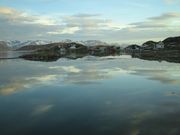 WATBIO project puts drought-tolerant crops in the spotlight
WATBIO project puts drought-tolerant crops in the spotlight
Water is the most important component of a plant's growth, but researchers have discovered that some plants can survive with less. Researchers in Europe are now working on developing crops that can tolerate droughts, specifically for bioenergy and bioproducts. The WATBIO ('Development of improved perennial non-food biomass and bioproduct crops for water stressed environments') project is funded under the 'Food, agriculture and fisheries, and biotechnology' Theme of the EU's Seventh Framework Programme (FP7) to the tune of EUR 9 million.
Led by the University of Southampton in the United Kingdom, the WATBIO consortium is investigating the productivity of crops in a future climate. Particular focus is being given to increasingly more episodes of drought and water shortage.
The researchers say both the availability and quality of water are the main concerns people have with respect to climate change, especially in terms of what the future holds for societies. Water is instrumental in helping farmers determine crop yields. Crop productivity, for instance, during the 2003 drought across Europe dropped by 30 %. Arable land in Europe is the victim of insufficient irrigation water, so developing drought-tolerant crops is high on the European agenda.
The WATBIO project partners, with various areas of expertise like crop breeding, academics and commercial work, have put the following non-food crops for energy use in the spotlight: poplar, miscanthus and giant reed. They are using sophisticated technologies now available for deoxyribonucleic acid (DNA) genome sequencing.
'Our primary aim is to characterise the vast amount of DNA variation in these under-utilised crops and harness this to produce better crops,' said Professor Gail Taylor, Director of Research for Biological Sciences at the University of Southampton. 'Even five years ago this project wouldn't have been possible as DNA sequencing was relatively expensive. Now we are sequencing the genome of more than 50 poplar trees, sampled from across contrasting sites in Europe, including droughted southern sites,' she added. 'From this we can identify small changes that might give us a clue to survival in stressful environments. These DNA variants can then be used in breeding programmes, enabling us to harness the power of molecular biology without the necessity of GM crops.'
Commenting on how important EU funding is and how this study will bring benefits for Europe through the development of new drought-tolerant crops, Dr Magnus Hertzberg of WATBIO partner SweTree Technologies (Sweden) said: 'The biological research conducted since Crick and Watson revealed the structure and function of DNA has reached the point where we can expect major breakthroughs in plant breeding. This EU funding has made possible a great collaboration between research scientists in universities and companies who deliver the benefits to society.'
For more information, please visit:
University of Southampton:
http://www.southampton.ac.uk/
Related stories: 34811
| Contact information | n/a |
|---|---|
| News type | Inbrief |
| File link |
http://cordis.europa.eu/fetch?CALLER=EN_NEWS&ACTION=D&RCN=35358 |
| Source of information | CORDIS |
| Keyword(s) | drought, crops, climate change |
| Subject(s) | AGRICULTURE , HYDRAULICS - HYDROLOGY , INFORMATION - COMPUTER SCIENCES , METHTODOLOGY - STATISTICS - DECISION AID , NATURAL MEDIUM , POLICY-WATER POLICY AND WATER MANAGEMENT , RISKS AND CLIMATOLOGY , WATER DEMAND |
| Relation | http://www.southampton.ac.uk/ |
| Geographical coverage | n/a |
| News date | 19/12/2012 |
| Working language(s) | ENGLISH |
 you are not logged in
you are not logged in





